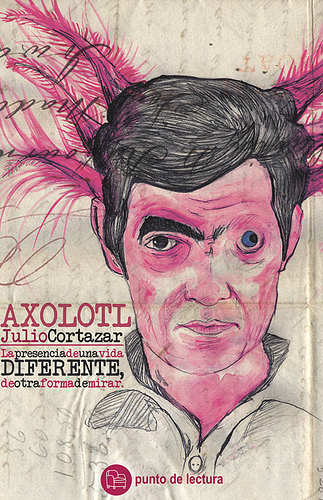Only By Living Absurdly
The narrator of Julio Cortázar’s Axolotl is a tantalizing character that has unsettled and bewildered readers. Neither the gender nor the age of the character is disclosed permitting a flexible interpretation of the text that has lead to different conclusions. Nonetheless, Cortázar unveils the thoughts and deliberations of the protagonist which honestly reveal his/her mental health. One’s unedited contemplations can create a curious story especially when the mind is ill and not functioning properly to produce feelings and emotions that are analogous to the rest of humanity.
In the 20th century, there has been a new focus on mental health in literature with popular works such as The Catcher In The Rye, One Flew Over the Cuckoo's Nest, and Fight Club to name a few. Furthermore, authors have been linked to issues in mental health and their relationship has inspired my reading of the short story (Rostiano). Science will provide an empirical explanation for mental dysfunction but literature constructs a subjective perspective that reveals qualities of the mind that are not seen through scientific lens.
Julio Cortázar’s formative years were influential in creating his personality and his writing style. Unfortunately, his circumstances were devastating at the start when his family, due to World War I, was forced to leave Belgium and return to their home country of Argentina (“Julio”). He later described his childhood in Argentina as "full of servitude, excessive touchiness, terrible and frequent sadness” (“Julio”). After his father left the family, Cortázar often became sick as a child and spent most of his time reading in bed. He wrote: "I spent my childhood in a haze full of goblins and elves, with a sense of space and time that was different from everybody else's." (“Julio”). Consistently, Cortázar wrestled with the challenges of mental health that undoubtedly shaped his future writing.
After close interpretation of Cortázar’s Axolotl, my bold conclusion is that the protagonist suffers from schizophrenia. A chronic disorder that is characterized by many factors that affects one’s social behavior, internal dialogue, and mental associations, schizophrenia impacts many young undeveloped brains and is most prevalent in males. In the context of Cortázar’s childhood, he too struggled with the symptoms of schizophrenia particularly concerning episodes of mental solitude. Although the narrator is not always reflective of the author, the resemblance between Cortázar’s childhood and the narrator’s struggles in Axolotl is uncanny.
One of the most noticeable characteristics of a schizophrenic is the episodic moments of psychosis. A schizophrenic can be true to his/her original character then suddenly switch to a different personality that is often confused, scared, and paranoid. Similarly, a feature of Cortázar’s story is when the narrative switches from describing the axolotls to actually being an axolotl, from external perspective to internal reflection. “Once in a while a (axolotl) foot would barely move…It’s that we (the axolotls) don’t enjoy moving a lot, and the tank is so cramped…The time fells like it’s less if we stay quietly.” Furthermore, the entire premise of the story—that a human believes to have metamorphosed into an amphibian—could be explained by his/her inability to differentiate between the real and the unreal events in life, transitioning from reality to psychosis. Such delusions of a different reality are essentially disrupting the narrator’s cognitive functions and is common in schizophrenics.
Given another person’s thoughts, one can then understand some qualities of his/her perspective. A classic example is asking a person whether a glass of water is half empty or half full and then concluding whether the person is a pessimist or an optimist. However, in the mind of a schizophrenic, being happy and positive is physically not possible. The negative symptoms of schizophrenia include a “flat affect” or reduced expression, reduced feeling of pleasure, and reduced speaking. The narrator displays all of these symptoms only they are not necessarily portrayed in him/her but also in the axolotls. For example, “It was their quietness that made me lean toward them fascinated the first time I saw the axolotls.” Perhaps this silent characteristic describing the axolotls fascinated the narrator because he/she can relate to being a quiet organism. Remember, the narrator believes that he/she is an axolotl while spending enormous amounts of time watching the axolotls, quietly. When the narrator is not watching the axolotls, they continue to bother his/her thoughts. “At any distance from the aquarium, I had only to think of them, it was as though I were being affected from a distance.” This consistent delusion of paranoia for the axolotls is another common symptom for schizophrenics.
Axolotls are larva and this interested the narrator; stating that, “They were larvas, but larva means disguise and also phantom.” Cortázar is again revealing more clues en route to laying out the narrator as a schizophrenic. First, larva meaning disguise perhaps hints at the hallucinations and delusions that are inside the mind of a schizophrenic; thoughts that must be covered in order to not reveal the true nature of his/her mental health. Secondly, larva meaning phantom, or a ghost, speaks to the haunting existence that spooks the narrator when he/she is associating with the axolotls. Recall that Cortázar described his childhood as being “in a haze full of goblins and elves,” these figments of his imagination might represent the numerous inventions of a schizophrenic’s mind.
This allegory could be what Cortázar meant to exhibit or it could be something else. Whether the evidence creates a hidden meaning through symbolism, I believe, is irrelevant to Cortázar. However, given the context of his childhood and his mysterious descriptions of the axolotls, Cortázar forces you to doubt your first impressions, to rethink, and to possibly create a new reality for the story.
Works Cited
"Julio Cortázar." <i>Wikipedia</i>. Wikimedia Foundation, n.d. Web. 24 Feb. 2016.
Rostiano, Joseph Jaynes. "THE WRITING LIFE: Writing and Mental Health." <i>Electric Literature</i>. N.p., 03 June 2014. Web. 24 Feb. 2016.



